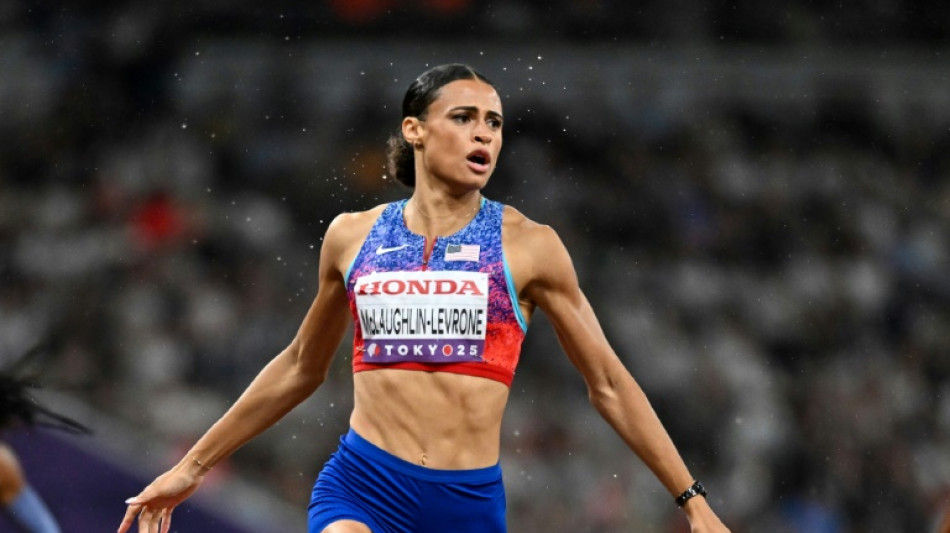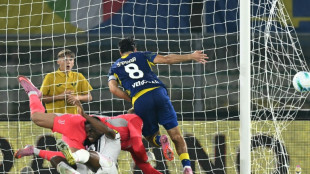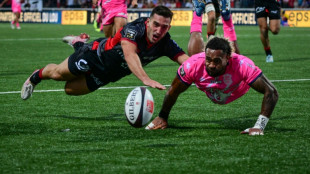
Duplantis and McLaughlin-Levrone lit up world championships

The world championships in Tokyo produced two standout performances from pole vaulter Armand Duplantis and Sydney McLaughlin-Levrone.
Other stars dazzled too in Japan's National Stadium as the USA and Kenya asserted their authority on the track.
ARMAND DUPLANTIS (Sweden, men's pole vault)
Deep into the Tokyo night, Duplantis electrified a packed crowd by setting the 14th world record of his career in an event he has re-defined.
The US-born Swede, one of athletics' genuine superstars, seems to be able to summon up world records at will -- his latest is 6.30 metres.
"I felt the only way to leave Japan was to set the world record," Duplantis said.
His ecstatic celebrations with his competitors, his parents and his girlfriend Desire Inglander, were also fun to watch.
SYDNEY MCLAUGHLIN-LEVRONE (USA, women's 400m)
She came, she saw and she duly conquered a new event, nearly breaking a 40-year-old world record in a remarkable women's 400m final.
McLaughlin-Levrone already dominates the one-lap hurdles event, so when the American fully turned her attention to the flat race, it was an exciting prospect.
She did not disappoint, blasting to a time of 47.78sec, the second fastest in history and just behind the 47.60sec set by Marita Koch of the former East Germany in 1985.
McLaughlin-Levrone was running on a wet Tokyo track. It is hoped that in different conditions, the American can one day erase a record that is widely viewed with suspicion because of East Germany's state-sponsored doping programme, although Koch never tested positive.
MELISSA JEFFERSON-WOODEN (USA, women's 100m and 200m)
The American glided to a 200m gold to complete the first women's sprint double at a world championships since Jamaican legend Shelly-Ann Fraser-Pryce in 2013.
Jefferson-Wooden left Olympic 100m champion Julien Alfred for dead in the short sprint, becoming the fourth fastest performer in history with a time of 10.61sec.
She was even more comfortable in the longer sprint, crossing the line metres ahead of Britain's surprise silver medallist Amy Hunt and former world champion Shericka Jackson of Jamaica.
OBLIQUE SEVILLE (Jamaica, men's 100m)
The 24-year-old Jamaican has long promised great things but in Tokyo he emphatically delivered, leaving teammate Kishane Thompson and Olympic champion Noah Lyles with the minor medals as he blasted to the men's 100m gold in 9.77sec.
In doing so, he ushered in a new era of men's Jamaican sprinting, following in the footsteps of his now-retired mentor Usain Bolt, a delighted spectator in Tokyo.
Guided by Bolt's old coach Glen Mills, Seville now has Olympic gold in Los Angeles in 2028 firmly in his sights.
"Track and field is both mental and physical. But to be honest, I think I have mastered the mental part of it. Now, more gold medals!" he said.
JIMMY GRESSIER (France, men's 10,000m)
Gressier was an unlikely winner of an event normally dominated by athletes from east Africa or of African origin.
In lively post-race interviews, the Frenchman thanked the sport's anti-doping authorities for "creating a level playing field", and promised to buy his girlfriend a car with his prize money.
BEATRICE CHEBET (Kenya, women's 5,000m and 10,000m)
Chebet turned on a blistering burst of speed to win the women's 5,000m and deny her fellow Kenyan Faith Kipyegon, the 1,500m winner, a double gold.
In the process, Chebet earned a memorable double herself, having also won the 10,000m.
The medals at these championships -- Kenya also won the men's 800m, marathon and the women's steeplechase -- were a much-needed tonic for the east African running powerhouse which is battling against a raft of doping cases, most notably one involving the women's marathon world record holder, Ruth Chepngetich.
GEORDIE BEAMISH (New Zealand, men's 3,000m steeplechase)
Beamish took a tumble in the heats of the 3,000m steeplechase but jumped to his feet and still qualified. Perhaps then it was written in the stars that he would produce a last-gasp spurt to edge defending champion Soufiane El Bakkali for gold in a thrilling final.
His surprise win was followed a day later by Olympic champion Hamish Kerr's high jump victory, making it a rare two golds for New Zealand.
K.Sosa--HdM

 London
London

 Manchester
Manchester
 Glasgow
Glasgow
 Dublin
Dublin
 Belfast
Belfast
 Washington
Washington
 Denver
Denver
 Atlanta
Atlanta
 Dallas
Dallas
 Houston Texas
Houston Texas
 New Orleans
New Orleans
 El Paso
El Paso
 Phoenix
Phoenix
 Los Angeles
Los Angeles



